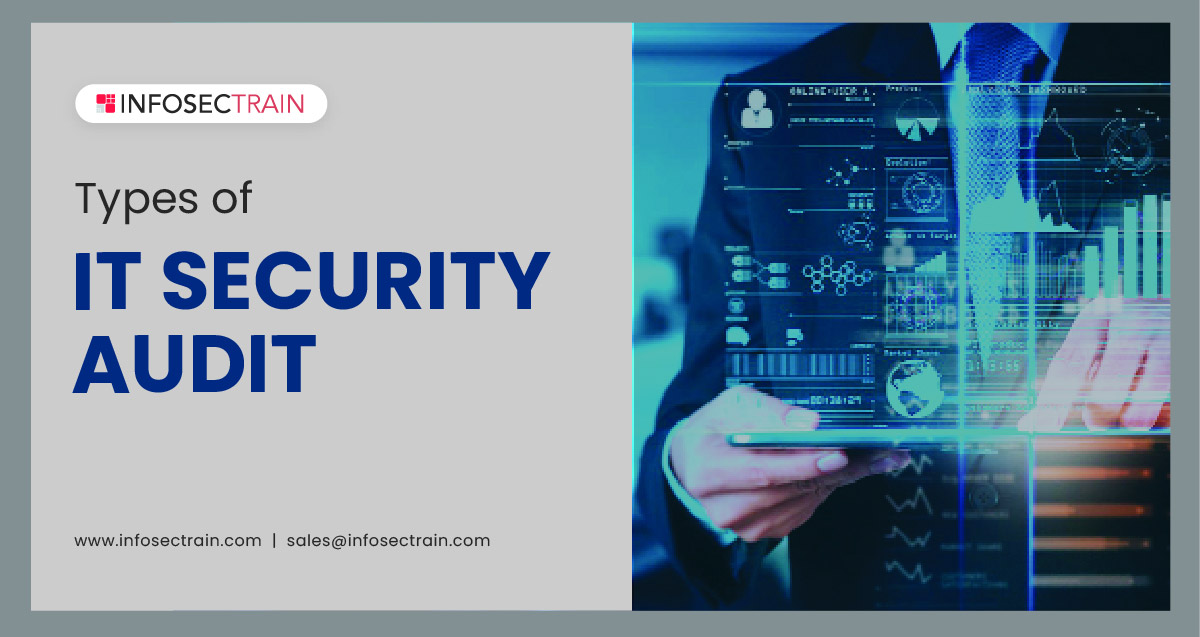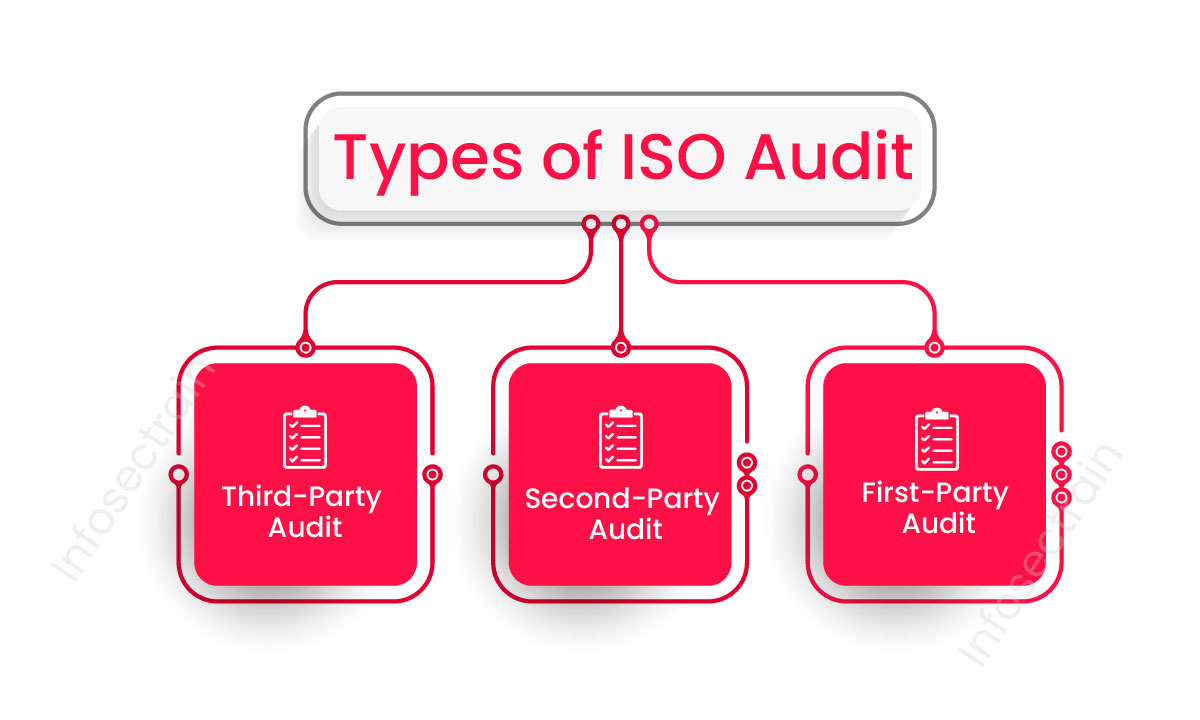Types of IT Security Audit

Table of Contents
What is ISO 27001?
ISO 27001 Audit
Types of ISO Audit
What is ISO 27001?
The International Organization for Standardization developed ISO 27001 as a standard. It is the foundation for an organization’s Information Security Management System (ISMS). The standard is divided into two straightforward sections: clauses (requirements, and hence not optional) and annex A controls (optionally used to mitigate identified information security risks).
ISO 27001 Audit
An organization’s Information Security Management System (ISMS) will be examined as part of an ISO audit to ensure it complies with the standards of the ISO 27001 standard. The ISMS is a systematic technique for ensuring an organization’s confidentiality, integrity, and availability. It is based on identifying potential risks to the organization’s information through risk assessment and managing the identified risks through implementing security measures.
Types of ISO Audit
There are three primary categories of audits in quality management, depending on the relationship between the auditing party and the audit subject.

1. Third-Party Audit : A third-party audit is performed when a firm decides to build a Quality Management System (QMS). The QSM meets a specified set of requirements and hires an outside organization to execute an audit to ensure that the organization has succeeded in this attempt. These autonomous organizations are referred to as certification entities or bodies. These organizations undertake audits to compare and verify the QMS meets and continues to satisfy the set standards.
-
- Certification audit: The initial certification process is divided into two stages.
Stage 1- Documentation review: The external auditor examines the ISO 27001 document you prepared, analyzes it to the ISO standard, and verifies compliance. The auditor will request to examine all of the documentation prepared for the ISMS and review them to confirm that all required paperwork is in place.
Stage 2- Main audit: The main audit includes an actual audit to determine whether your organization operates the ISMS per ISO standards. The auditor will assess the effectiveness of preventive and mitigation measures and review the activities from the Stage 1 ISO 27001 audit to confirm that the improvement requests have been addressed.
- Maintenance or surveillance audit: Surveillance Audits are required to retain the ISO 27001 certification but are not as extensive as the Stage 2 ISO 27001 assessment. The audit is often performed after the first and second years of certification. The auditor follows a similar procedure as in Stage 2 ISO 27001 audit, reviewing anomalies and corrective actions, document updates, maintenance, and performance of the ISMS, among other things.
- Re-certification audit: The Recertification Audit, similar to the Stage 2 ISO 27001 audit, includes an assessment of previous audit non – conformities and OFI (Opportunity For Improvement).
2. Second-Party Audit : A second-party audit is conducted when an organization analyzes vendors to ensure they adhere to the agreement’s obligations. These prerequisites include exceptional control over these methods (such as soldering or welding), traceability of parts (knowing which features are used in which products), specific quality standards, collected data, or a variety of other things of particular interest to that client. These audits are carried out on-site by looking at the procedures or the supplier’s submitted documents off-site. It is important to note that a second-party audit between the client and the supplier has nothing to do with certification.
Many individuals believe that a second-party audit is unnecessary once an organization has been certified by the ISO 9001 certification authority, but this is not true. Although you have received certification from a third-party audit, any clients might still want to conduct a second-party audit to look at specific terms of their contract, particularly if these terms differ from the ISO 9001 standards. However, it is specified in particular agreements, and some customers decide to do these audits; this is not something that all customers require or that must be certified to ISO 9001 by a certification authority.
3. First-Party Audit : Internal audits are a common name for first-party audits. This is when an organization representative audits a process or group of procedures in the quality management system to ensure they adhere to the standards established by the business. The first-party audit, which searches for gaps, non-conformities, and vulnerabilities in the ISMS, is similar to a reconnaissance before the external audit. Before creating an internal audit report, the internal audit will examine ISMS performance and review the documentation.
Here’s an example of what the first-party audit will entail:
- Documentation review: The internal auditor will examine all supporting paperwork, ensure the audit criteria sufficiently addresses ISMS, and assess the controls for compliance with the ISO Standard.
- Field review: The internal auditor will examine the ISMS, run tests, and gather data to show what is and isn’t working. Additionally, they will interact with various teams to discover how they adhere to the ISMS.
- Internal audit review: The auditor will deliver an internal audit report to management based on their findings and analysis. The report will outline the audit’s scope, goal, and breadth. It will also provide evidence of which policies, processes, and controls are effective and which ones are not.
- Management review: The internal audit report is reviewed by management. The auditor and management go through the list of significant and moderate errors, action plans, and whether the organization is ready for external auditing and ISO certification.
ISO 27001 Lead Auditor with InfosecTrain
The success of every management system is dependent on auditing. As a result, it entails significant obligations, challenging obstacles, and complex problems. InfosecTrain is a well-known provider of IT security training worldwide. If you want to know the best way to pass the ISO/IEC 27001:2013 Lead Auditor certification exam, join InfosecTrain’s ISO 27001 certification training courses.
TRAINING CALENDAR of Upcoming Batches For ISO 27001 : 2022 LA
| Start Date | End Date | Start - End Time | Batch Type | Training Mode | Batch Status | |
|---|---|---|---|---|---|---|
| 09-Mar-2024 | 07-Apr-2024 | 19:00 - 23:00 IST | Weekend | Online | [ Open ] | |
| 06-Apr-2024 | 12-May-2024 | 09:00 - 13:00 IST | Weekend | Online | [ Open ] |




 1800-843-7890 (IN)
1800-843-7890 (IN) sales@infosectrain.com
sales@infosectrain.com
 1800-843-7890 (India)
1800-843-7890 (India) 
